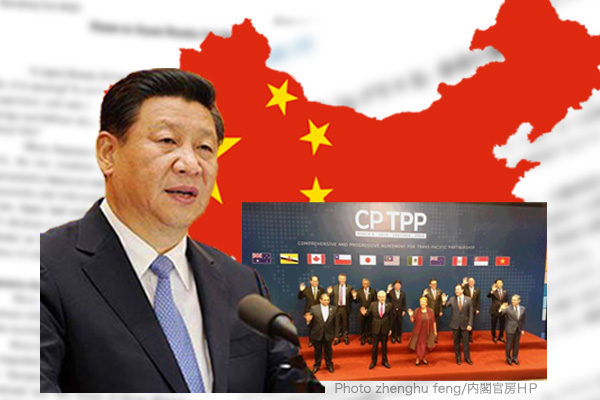On November 20, Chinese President Xi Jinping expressed his willingness to join the Trans-Pacific Partnership free trade agreement. Just after signing the Regional Comprehensive Economic Partnership agreement excluding the United States, Xi acts like a champion of free trade and multilateralism in a manner to preempt the incoming U.S. Biden administration.
This is more than just a political pose. Xi has made clear that China would make other countries to depend more on China for their supply chains and would use the economic leverage as a weapon. Closer economic relations could lead to such situation.
China hoping to break through anti-China coalition
What is more important for China is to break through an international coalition against China. China has a growing sense of danger about the recent enhancement of Japan-U.S.-Australia-India quadrilateral cooperation and sees the TPP as part of the anti-China coalition.
From the Chinese standpoint, it would be the worst if the U.S. gets back to the TPP under the Biden administration and strengthen the anti-China coalition. In that case, China would face tough negotiations with the U.S. in a bid to join the TPP and would be pushed into a corner. To avoid such development, China would better join the TPP before the U.S.’ comeback. If China joins before, it could block the U.S. return conversely and exclude the U.S. from the Asian economic region. China could also take advantage of its TPP membership to prevent Taiwan’s accession and further isolate Taiwan.
But the hurdle for China to join the TPP is high. The levels of trade liberalization and trade rule under the TPP are quite different from those of the RCEP. Does Beijing really believe that it can clear tough accession conditions?
For example, the TPP prohibits member governments from giving preferential treatment to state-owned enterprises. President Xi has pursued an opposite direction, making it clear to prefer state-owned enterprises to private companies. He may be planning to blur this point through negotiations or make empty promises. Such suspicion emerges from China’s failure to implement many promises it made when joining the World Trade Organization in 2001. China should not be allowed to repeat such breach. We can never expect to utilize the TPP as an outside pressure means for promoting China’s domestic reforms.
Japan positioned to determine the future of TPP
Will China’s show of willingness to join the TPP awaken the U.S. that has lacked any Asian strategy under the Trump administration? It is decisively important for Washington to join the TPP before Beijing because the U.S. would be excluded from the Asian economy and isolated if China joins before the U.S. The incoming Biden administration might seek to add demands on environmental and labor issues to protect American jobs at future negotiations for the U.S.’ comeback to the TPP, giving consideration to leftist Democrats. If this leads the negotiations to be stalled, however, it would only please Beijing.
How should Japan deal with a U.S.-China tug of war over the TPP? Japan should give top priority to the U.S. comeback but the Japanese position might generate resentment from other TPP members depending on the U.S. demands. China would use its vast market to lure Japan’s business world.
Japan, which has concluded the TPP agreement without participation of the U.S., will chair the TPP next year. Japan’s position to be taken will determine the future of the TPP.
Masahiko Hosokawa is a professor at Meisei University and a former director-general of the Trade Control Department at Japan’s Ministry of Economy, Trade and Industry. He is also a Planning Committee member at the Japan Institute for National Fundamentals.


